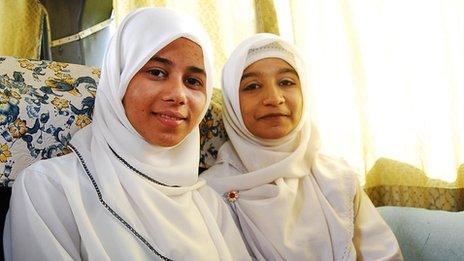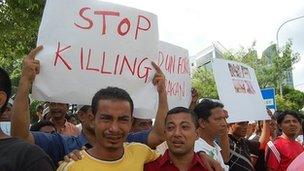Rohingya Muslims want to call Malaysia home
- Published

Sharifah (left), a Muslim Rohingya refugee from Burma, wants to live in Malaysia permanently
Sharifah binti Hussein is a bubbly 17-year-old who loves school.
Her classroom at the Harvest Centre in Kuala Lumpur is stuffy, even with the windows open and ceiling fans on full blast. Eighteen of her classmates are huddled around clusters of desks.
This may look like a regular class, but all the children are refugees, mainly from Burma. They are not allowed to attend government schools, access health care or even work when they graduate.
Their grim prospects make today's class lesson seem futile - learning Malay, the national language of Malaysia. Yet Sharifah counts this as her favourite subject.
"If I can, I would like to stay in this country forever, so it's important for me to learn Malay," she says in broken English.
Tough childhood
Sharifah's love for Malaysia comes in part from a tough childhood in Burma. Although she was born there, she has never been issued a birth certificate.
She is part of the stateless Rohingya Muslim minority. International rights groups describe their plight as one of the world's most enduring refugee crises.
The Burmese government says the Rohingyas are relatively recent migrants from what is now known as Bangladesh.
Recent unrest in Burma's Rakhine state has focused attention on the Rohingyas' situation.
Sharifah's father says he was harassed by the Buddhist military government and fled to Malaysia in 1994. The rest of the family tried to join him a few years later. It took two attempts before they could flee.
Sharifah herself travelled alone for a month.
"We would sleep in abandoned buildings," she says. "It was very scary at night. One night, we stayed in the city, one night in the jungle."
When she arrived in Malaysia her father could not even recognise her.
"When he left me, I was fat. I had lighter skin. I was beautiful. He said I was cute," she says. "But now I looked like a boy because my hair was short. I was dark-skinned. I was thin and my father didn't recognise me."
Reunited with her family, Sharifah said she felt free for the first time.
But life is not much easier in Malaysia. The country is not a signatory of the 1951 United Nations Convention on Refugees, so asylum seekers are treated like illegal migrants and are vulnerable to detention.
Despite this, Rohingya Muslims continue to arrive in Malaysia. They now make up the second largest refugee group in this Muslim-majority country, with 22,800 registering with the UN by the end of April.
Hard life
Sharifah had a tough time adjusting to Malaysia. She attended a regular school here, but no one wanted to talk to her because she was a refugee, she says.
"They accused me of coming to Malaysia to take away resources from them, taunting me for having darker skin," she says.
Her life improved after she switched to a school for refugees at the Harvest Centre. She now has friends, is earning top grades and dreams of working at the UN to help refugees.
"I pray to my god, my Allah, that I can stay in Malaysia forever," she says. "I don't want to go to other countries where it is not a Muslim place."
Her father, Hussein, 45, is not so optimistic, however. He struggles to feed his family. He lives in constant fear of the police. Although he holds a refugee card from the UN, it is not a legal document, so immigration officials can still detain him.
Hopes for change
International rights groups say arbitrary detentions of refugees and extortion by Malaysian immigration officials are common.
But a 2011 report by the UN refugee agency, UNHCR, noted that there have been "significant achievements" by the Malaysian government to reduce the number of arrests of refugees last year.
Still, Mr Hussein does not have an alternative. It has been 18 years since he arrived in Malaysia, but the UN has not been able to relocate them to another country.
The recent violence in Burma's Rakhine state makes it even more unlikely that they can return.

Hundreds of Rohingya refugees rallied the US Embassy in Kuala Lumpur on Tuesday
Clashes between Buddhists and Muslims have prompted the Burmese government to declare a state of emergency in the area.
Hundreds of Rohingya refugees showed up at the US embassy in Kuala Lumpur last Tuesday, calling for international intervention.
"We had hoped that opposition leader Aung San Suu Kyi would change the situation in Burma," Zafar Ahmead Mohd Abdul Ghani, from the Myanmar Ethnic Rohingya Human Rights Organization Malaysia, said at the rally.
"But now, our hopes for her have been banished. We are very scared to go back home."
Meanwhile, Sharifah tries hard to fit in in Malaysia.
She now prefers to speak to her father in Malay rather than in the Rohingya language. She has adopted many Malaysian habits, ending her sentences with the word "lah", and wearing skinny jeans and colourful hijabs like young Malay teens.
However, she still feels unwelcome in the country.
Sharifah remains hopeful, though.
"I believe that Malaysia will recognise refugees," she says. "I don't know why in my heart I believe in this, but I do."